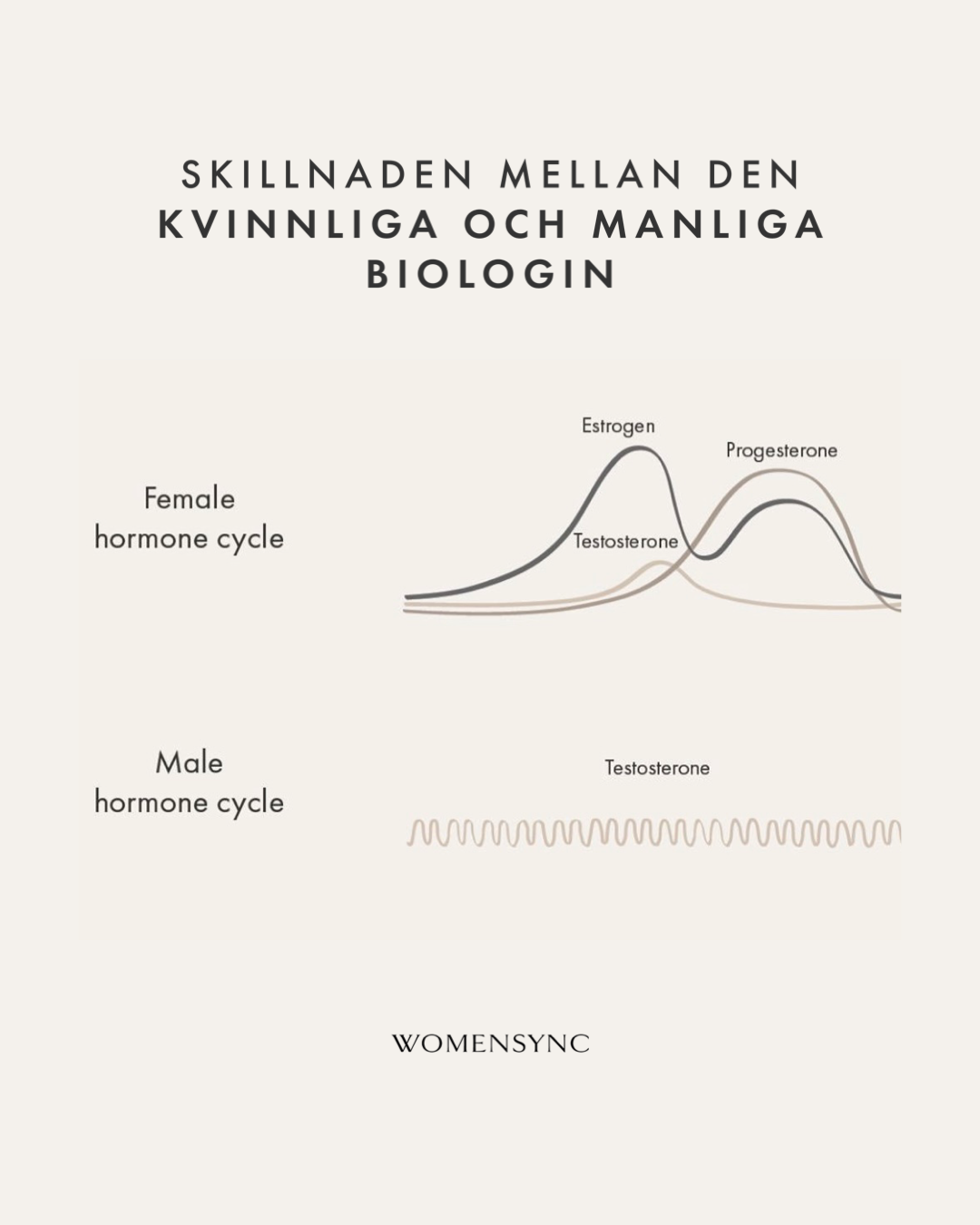This is a transcribed excerpt from the Womensync Podcast, episode #1 All about the menstrual cycle and how you can influence it with Jenny Koos . Some adaptations of the text have been made. To listen to the podcast episode with Jenny click here .
In the episode with Jenny Koos , the conversation began with how she describes her mission to elevate the place of the female body in society. We came unsought into why women's health and the female body in general have a great need to take up more space and receive more attention, both in research, medicine and in society as it looks today.
What would you say is your mission right now?
I think it's pretty obvious. Many people wonder how I can be so passionate when I have been talking about the same things for more or less 12-15 years and have been very consistent and fiery. It is because this is my calling. Our rights and the place of the female body, which I think it must be allowed to take but not given.
Living in a society built for masculinity
Can you tell us a bit about why the woman's body and women's health do not get enough space? What has led to it looking like this?
As society looks like (by that I mean industrialism, capitalism, patriarchy and so on) it is structured and in many ways built on the basis of what can be called masculine principles. Now I'm not referring to gender here, but to values around “ male versus female energy ”. There are different types of qualities that can be valued higher or lower. Linear, even production and steady growth can be considered "masculine". It is highly valued in society, while cyclicity; to have periods where you are anything but extremely productive, where things fluctuate and you feel other things - this is usually classified as "feminine". Unfortunately, not being able to perform exactly the same every day is also often classified as something negative.
Things that are very evident in female biology are also things that are not valued very highly, because they don't give the kind of returns that you want in this society. That's not how it's built, quite simply, because it's been men's bodies that have been the starting point, and men that have ruled. It is felt in research, medicine, social structures, wage gaps, in all sorts of different ways we see how the female aspects of life are valued less - not gender - but yin and yang (the masculine and the feminine). Yin is valued very low while yang is valued very highly. I know it may sound a bit fuzzy, but if you look at the purely practical aspects, it shows. In other words, that imbalance is something that also affects men negatively.
When it comes to research connected to the female body, she can be considered difficult because the hormone levels are not the same every day. When creating medicine, for example, you often want metrics to go by, but women's values fluctuate. Men are more stable in their values and therefore more research is done on men than women. It's easier. This means that some medications do not work on women of menstruating age or that they work differently on women depending on where we are in the cycle. There are, for example, studies on healing after surgery that show that it is more favorable to have surgery when you are on the way to ovulation ( during phase 2 ) because then the immune system is more active than it is to have surgery right during your period or just before ( phase 1 and 3 ) because then the immune system is lowered. I wish that things like this were looked at more and taken into account more. What I want to try to give to women, i.e. biological women, is that they should know this basic thing - understand their own biological conditions. Based on that knowledge, everyone can of course do what they want with their bodies.
What does it mean to be cyclical as a woman?
It's about women having a biphasic cycle. Men also have cycles – all organs work in different cycles. The difference is that, purely hormonally, men have a sex hormone that responds: testosterone. Then they have other hormones as well, but as far as their main sex hormone is concerned, it is testosterone that applies and that cycle lasts over a day. They have the most testosterone in the morning, it's not much more complicated than that. Women have estrogen and progesterone in two different phases and this means that these two different phases are quite distinct and about two weeks long each. This means that the dominant hormone in each phase has a big impact on everything from, for example, healing to horniness, mood, etc. It is also good to know that if you go on, for example, birth control pills, these shifts are shut down because our sex hormones are "flattened" by the contraceptives. Here you can see Jenny's lecture on hormonal contraceptives.
The menstrual cycle – a woman's fifth sign of health
Speaking of these differences between male and female biology, the menstrual cycle is usually called a woman's fifth sign of health. Why is the menstrual cycle so important?
When you talk about the menstrual cycle, most people think of "the period", that is, the days we bleed, as the main event in the menstrual cycle. But the central and important part of the cycle is ovulation . Before ovulation, you produce eggs that lie in follicles. Estrogen is produced in the follicles. Estrogen is the dominant hormone in the first part of your menstrual cycle (the end of phase 1 and phase 2) and it has a number of effects in the body regarding everything from bone structure, sex drive, mucous membranes to the brain's neurotransmitters. When you ovulate, you produce progesterone which in turn has a number of effects. Simply explained, estrogen and progesterone balance each other out. The progesterone has a more calming, stabilizing effect while the estrogen is the hormone that makes things grow and has a slightly more "staring" effect on the cycle.
In terms of research, there is far too little that addresses the benefits of producing progesterone (which we only produce when we ovulate ). If you exercise too much, weigh too little (for example with HA ) and thus have irregular or missed periods, one of the side effects is estrogen deficiency because the eggs do not grow, but of course you also get a progesterone deficiency. If you do not ovulate, the progesterone is not produced. Some claim that the menstrual cycle is completely unnecessary or something you don't need to have, but then they also say that ovulation is unnecessary. Then you ignore how important both of our sex hormones are because together they contribute to the body's structure and functions. The bleeding itself may not be of the greatest importance, but the estrogen and progesterone production is said to be. We cannot assume that half the menstrual cycle, which we are created to go through, has no value. We need more research to really appreciate its full value, but that research does not currently exist.
Thinking of the menstrual cycle as a woman's fifth sign of health is about being healthy, feeling good and being vital. If you're too sick to bear a child, you're probably not feeling well either. If your body can't bear to ovulate, it means physically that you shouldn't have children either. The body has decided that you have too many other things to take care of right now, there is no room for children. Of course, you don't want to have children every month, but it's a good sign to be able to, it's a positive thing if your body shows that it's possible. The bicycle itself has an intrinsic value for our health. That is why it is also called " the fifth sign of health " and is in good company with breathing, heart rate, blood pressure and body temperature.
–––––––––––––––––––––––––––––––––––––––––––––––––– ––––––––––––––––––––––
If you want to learn more about the phases of the menstrual cycle, how you can benefit from them and how you can use lifestyle as a tool to feel better during the month, we recommend you read Womensync - For a life in sync with your female biology and Jenny 's book "Fertility understanding" will be released in spring 2022 and will help you understand your hormones and how you can feel your best in your female body. If you want to read more about Jenny Koos, you can find her here . See also her lecture platform Boon , which is filled with important information connected to the menstrual cycle, e.g. lectures on the menstrual cycle , promoting ovulation , estrogen and progesterone .
Here you can take part in part 2 of Jenny's episode where we talk about the difference between being healthy and having enough resources to feel good and part 3 exercise linked to hormones and the menstrual cycle.

